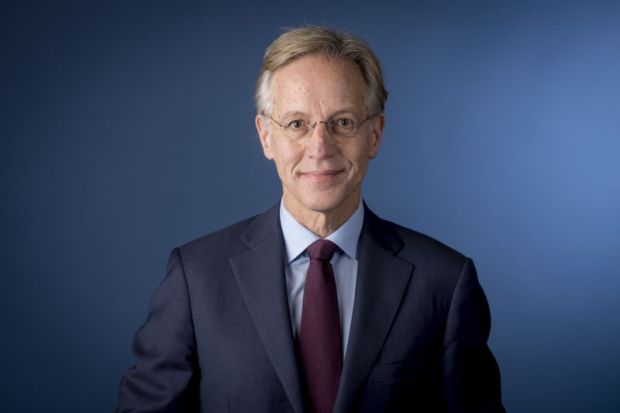In most parts of the world, any government effort to control international student numbers would be met with fury.
In the Netherlands, however, politicians and universities had grown increasingly impatient waiting for their academic-turned-education minister, Robbert Dijkgraaf, to produce his plans to better stem the flow of eager students who flock to the country every year, making up 40 per cent of the intake in 2021-22.
An outline of the plans finally arrived on 21 April. They include more ministerial control, with caps on places for English-language tracks in degree programmes, freezes on non-European Union admissions if courses fill up, and more emphasis on Dutch-language teaching and administration.
“We are happy with our success; we just want to make it sustainable,” the minister told Times Higher Education.
Mr Dijkgraaf, who until his appointment in January 2022 spent a decade as director of the Institute for Advanced Study in Princeton, New Jersey, is trying to take a long-term view of the reforms. “Sustainable doesn’t mean static,” he said. “Sustainable means that it can grow whatever happens with society, what happens in the world.”
The mathematical physicist, who worked in string theory, started his research career at Princeton University after studying his bachelor’s, master’s and doctorate at Utrecht University. His subsequent return to the Netherlands as a professor at the University of Amsterdam began an ascent in academic leadership, notably as president of the Royal Netherlands Academy of Arts and Sciences.
“One of the great pleasures of the academic world is that it’s largely self-organised, and I feel that as a minister you are still part of that whole system, but with a slightly different role to play,” he said. Mr Dijkgraaf has been accused by critics in parliament of overthinking and even dithering over reform. Is it possible his academic background is a disadvantage?
“In politics there’s an advantage to knowing the field well and there’s also a disadvantage,” he said, accepting he inevitably has “blind spots”, but not the claim his cogitation was counterproductive. “I often think when we change things in our education system it’s a little bit like open-heart surgery, because the university should keep on functioning and we have to be extremely careful how we do this.”
For Mr Dijkgraaf, Dutch universities’ success and attractiveness have been underpinned by universal access for domestic school-leavers, high-quality teaching and research, and an acute awareness of societal needs, all of which must remain optimal as international intakes are throttled.
The Netherlands’ existing model, which allocates university funding based on student numbers and market share, had created a “tragedy of the commons”, he said, which incentivised endless growth, leading to a squeeze on housing, lecture halls and teachers’ sanity, particularly in major cities.
Making the sector sustainable is not the only thing that has been occupying Mr Dijkgraaf’s time as minister. The recent sacking of Susanne Täuber, a German-born organisational behaviour specialist and long-time critic of her institution, the University of Groningen, led to protests across the country in support of her right to speak out.
While careful not to comment on the specifics of the case, he said that as a scientist, institute director and minister he welcomed and benefited from criticism. “Any institution, including government, should be a learning institution. But this is something we ask first and foremost from our educational institutions,” he said.
Dr Täuber’s dismissal began with a broadside against a gender-equality programme that she said was counterproductive. Mr Dijkgraaf said the Netherlands’ progress on diversity and inclusion was, as a whole, “frustrating”.
“It’s not only a matter of making sure your student body or faculty is diverse,” he said, “but also that the institution expands to give space to different voices.”
Recent cases have shown that perhaps the greatest threat to Dutch academic freedom comes from outside the country. Last year Vrije Universiteit Amsterdam became Europe’s poster child for malign interference when it emerged that its human rights institute, which had played down fears of Uyghur repression, was mostly funded by the Chinese state.
Mr Dijkgraaf said he saw transparency as the best cure for such problems, whether funding came from foreign countries, companies or NGOs. Academics should be proactive in declaring their support, even when acting outside their institutional roles, he said. “There is no argument not to be maximally transparent.”
The Netherlands has, of late, appeared to be tacking closer to the US, tightening controls on the export of chipmaking equipment and agreeing to host a Nato innovation centre. But despite his transatlantic CV, the education minister said he had little interest in a North American-style crackdown on Chinese collaboration.
He said Europe’s approach to international research, with “various poles competing but also collaborating” is “extremely attractive”. “I think it’s one of the few things that Europe can really do well.” The continent, “in many ways the birthplace of modern science and the modern research university…deserves to chart its own course in terms of what is happening in the world”.
Register to continue
Why register?
- Registration is free and only takes a moment
- Once registered, you can read 3 articles a month
- Sign up for our newsletter
Subscribe
Or subscribe for unlimited access to:
- Unlimited access to news, views, insights & reviews
- Digital editions
- Digital access to THE’s university and college rankings analysis
Already registered or a current subscriber? Login








